Managerial Accounting Report: System Analysis and Technique Evaluation
VerifiedAdded on 2022/10/09
|12
|4301
|34
Report
AI Summary
This report provides a critical evaluation of management accounting systems (MAS) based on two journal articles. It analyzes the implementation of MAS techniques, such as Balance Scorecard (BSC), Activity-Based Costing (ABC), Just-in-Time (JIT), and Total Quality Management (TQM), by contemporary companies, focusing on their impact on business goals and managerial decision-making. The report examines the relevance of MAS in uncertain business environments and compares findings from the two articles, highlighting implications for management accountants. The analysis covers the usefulness and relevance of MAS, examining its application in a multinational manufacturing company and assessing the role of IT integration in the extent of ABC use and its effect on business strategy and market performance. The report also evaluates the relevance of the accounting system to organizational levels, with an emphasis on operational and tactical decision-making.
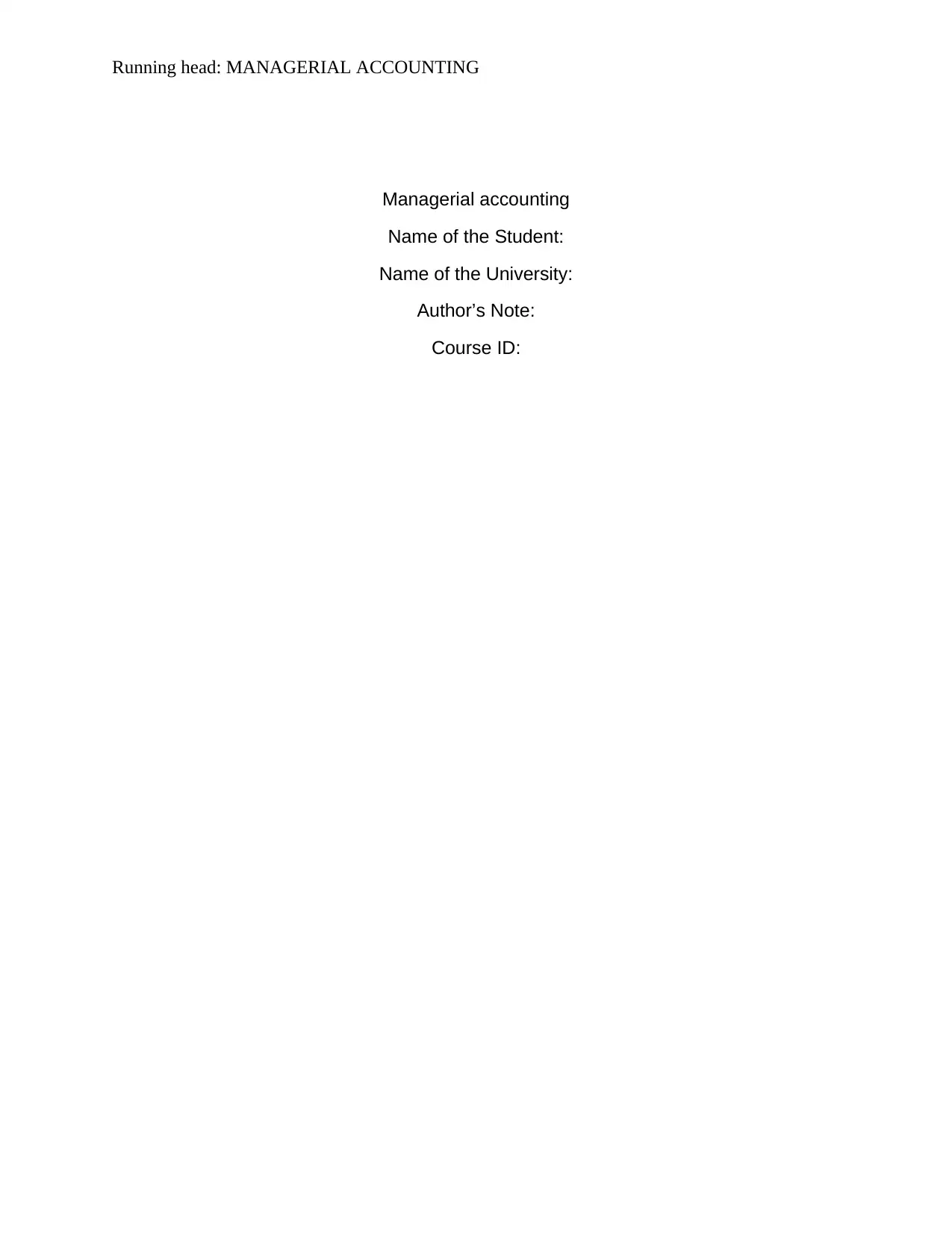
Running head: MANAGERIAL ACCOUNTING
Managerial accounting
Name of the Student:
Name of the University:
Author’s Note:
Course ID:
Managerial accounting
Name of the Student:
Name of the University:
Author’s Note:
Course ID:
Paraphrase This Document
Need a fresh take? Get an instant paraphrase of this document with our AI Paraphraser
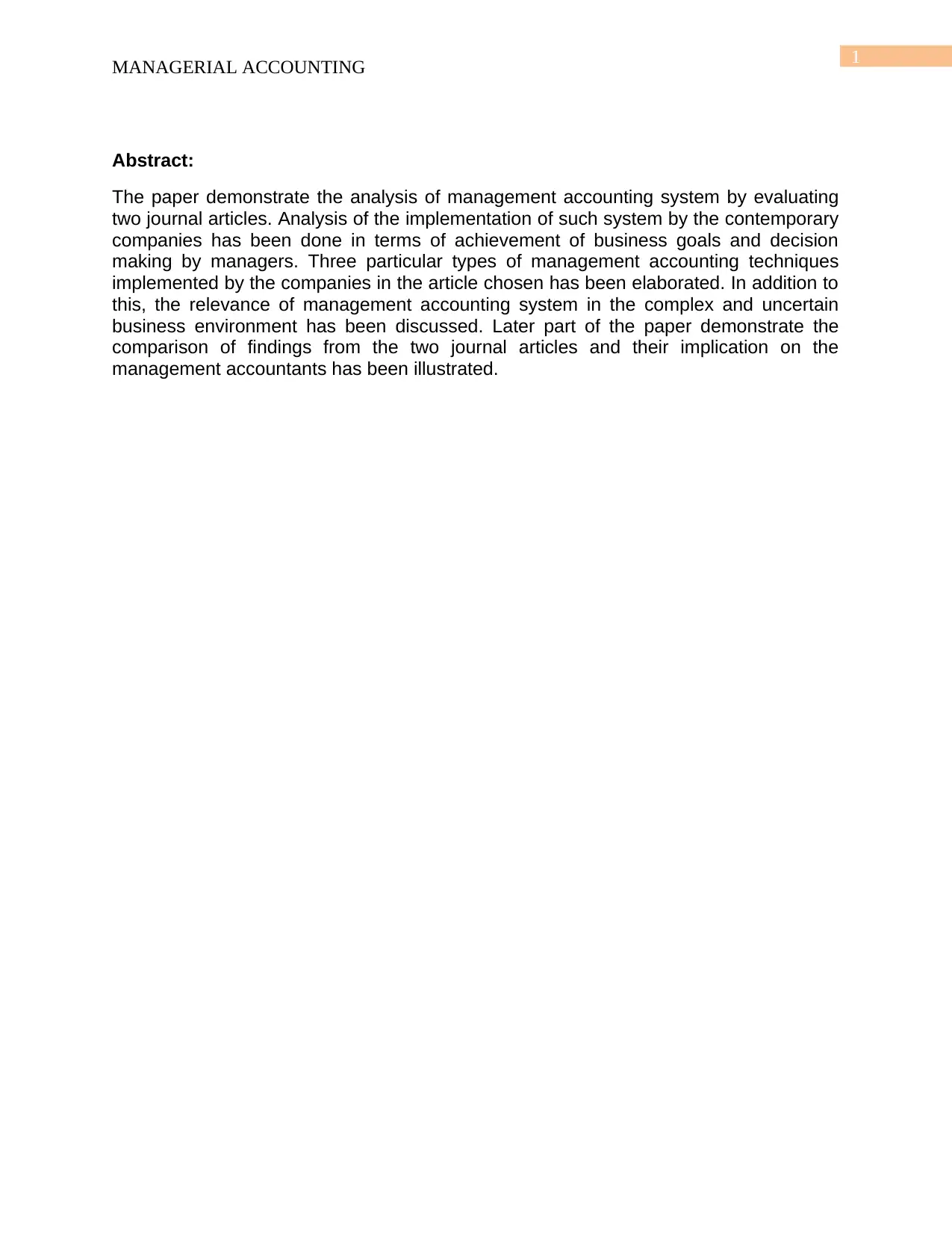
1
MANAGERIAL ACCOUNTING
Abstract:
The paper demonstrate the analysis of management accounting system by evaluating
two journal articles. Analysis of the implementation of such system by the contemporary
companies has been done in terms of achievement of business goals and decision
making by managers. Three particular types of management accounting techniques
implemented by the companies in the article chosen has been elaborated. In addition to
this, the relevance of management accounting system in the complex and uncertain
business environment has been discussed. Later part of the paper demonstrate the
comparison of findings from the two journal articles and their implication on the
management accountants has been illustrated.
MANAGERIAL ACCOUNTING
Abstract:
The paper demonstrate the analysis of management accounting system by evaluating
two journal articles. Analysis of the implementation of such system by the contemporary
companies has been done in terms of achievement of business goals and decision
making by managers. Three particular types of management accounting techniques
implemented by the companies in the article chosen has been elaborated. In addition to
this, the relevance of management accounting system in the complex and uncertain
business environment has been discussed. Later part of the paper demonstrate the
comparison of findings from the two journal articles and their implication on the
management accountants has been illustrated.
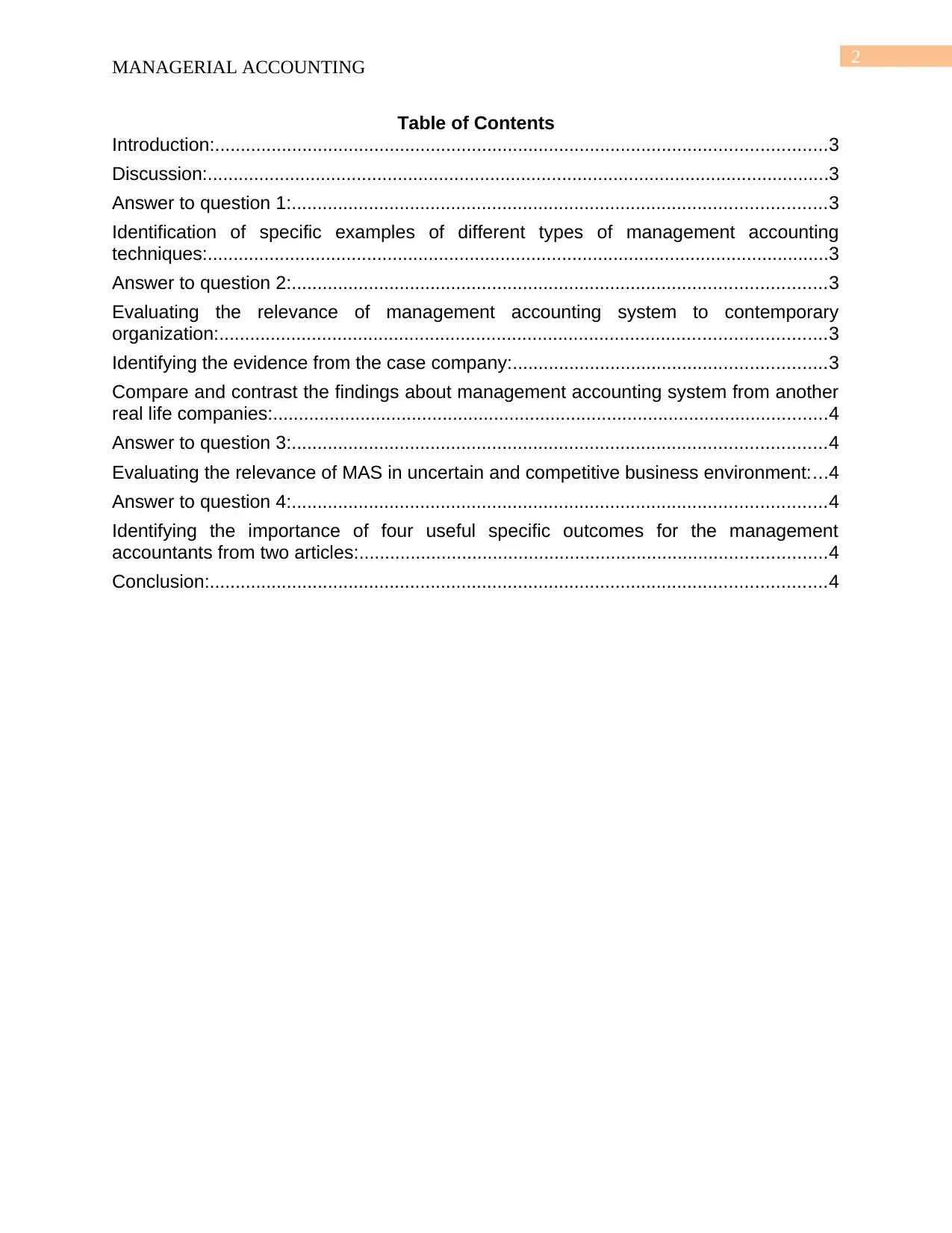
2
MANAGERIAL ACCOUNTING
Table of Contents
Introduction:.......................................................................................................................3
Discussion:.........................................................................................................................3
Answer to question 1:........................................................................................................3
Identification of specific examples of different types of management accounting
techniques:.........................................................................................................................3
Answer to question 2:........................................................................................................3
Evaluating the relevance of management accounting system to contemporary
organization:......................................................................................................................3
Identifying the evidence from the case company:.............................................................3
Compare and contrast the findings about management accounting system from another
real life companies:............................................................................................................4
Answer to question 3:........................................................................................................4
Evaluating the relevance of MAS in uncertain and competitive business environment:...4
Answer to question 4:........................................................................................................4
Identifying the importance of four useful specific outcomes for the management
accountants from two articles:...........................................................................................4
Conclusion:........................................................................................................................4
MANAGERIAL ACCOUNTING
Table of Contents
Introduction:.......................................................................................................................3
Discussion:.........................................................................................................................3
Answer to question 1:........................................................................................................3
Identification of specific examples of different types of management accounting
techniques:.........................................................................................................................3
Answer to question 2:........................................................................................................3
Evaluating the relevance of management accounting system to contemporary
organization:......................................................................................................................3
Identifying the evidence from the case company:.............................................................3
Compare and contrast the findings about management accounting system from another
real life companies:............................................................................................................4
Answer to question 3:........................................................................................................4
Evaluating the relevance of MAS in uncertain and competitive business environment:...4
Answer to question 4:........................................................................................................4
Identifying the importance of four useful specific outcomes for the management
accountants from two articles:...........................................................................................4
Conclusion:........................................................................................................................4
⊘ This is a preview!⊘
Do you want full access?
Subscribe today to unlock all pages.

Trusted by 1+ million students worldwide
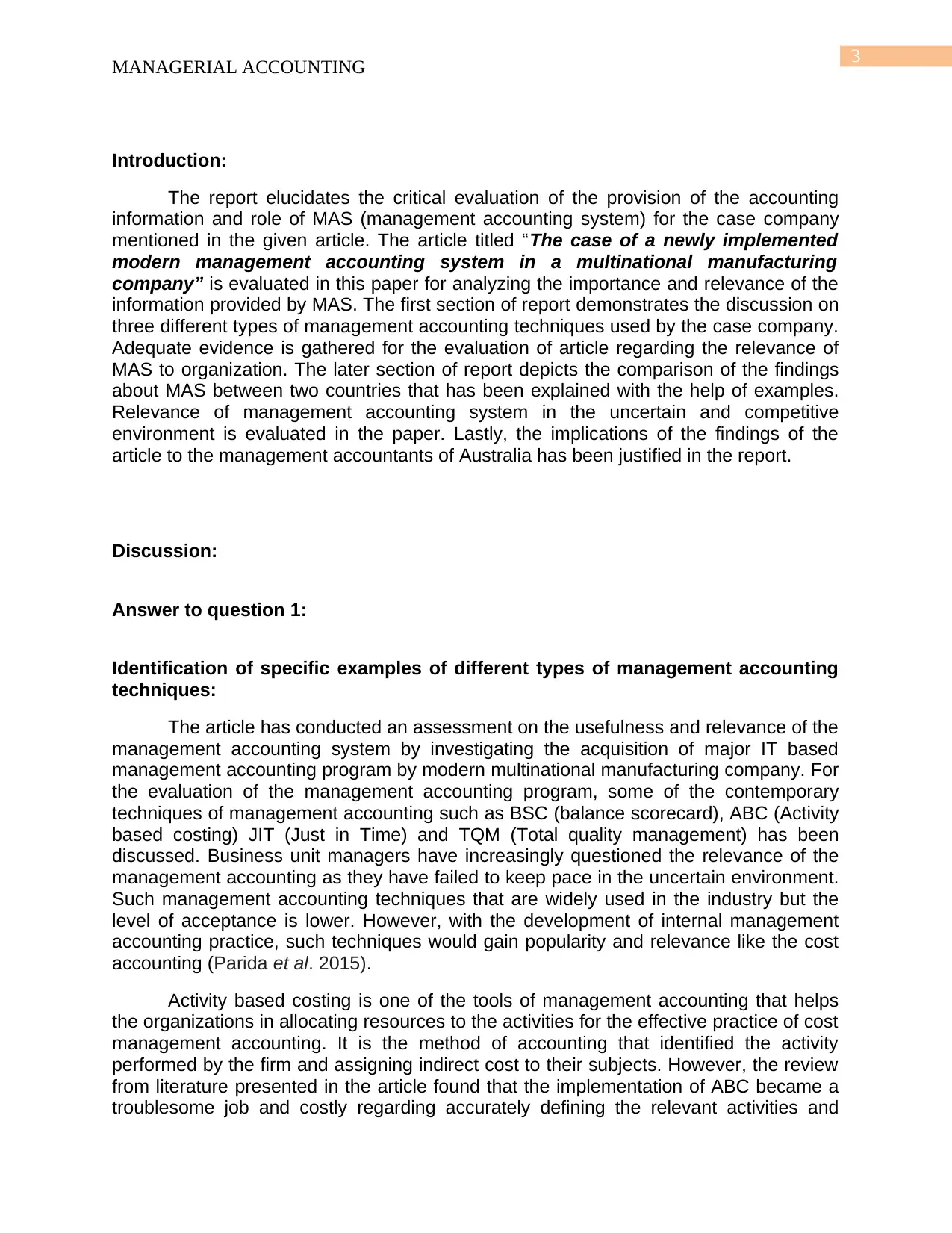
3
MANAGERIAL ACCOUNTING
Introduction:
The report elucidates the critical evaluation of the provision of the accounting
information and role of MAS (management accounting system) for the case company
mentioned in the given article. The article titled “The case of a newly implemented
modern management accounting system in a multinational manufacturing
company” is evaluated in this paper for analyzing the importance and relevance of the
information provided by MAS. The first section of report demonstrates the discussion on
three different types of management accounting techniques used by the case company.
Adequate evidence is gathered for the evaluation of article regarding the relevance of
MAS to organization. The later section of report depicts the comparison of the findings
about MAS between two countries that has been explained with the help of examples.
Relevance of management accounting system in the uncertain and competitive
environment is evaluated in the paper. Lastly, the implications of the findings of the
article to the management accountants of Australia has been justified in the report.
Discussion:
Answer to question 1:
Identification of specific examples of different types of management accounting
techniques:
The article has conducted an assessment on the usefulness and relevance of the
management accounting system by investigating the acquisition of major IT based
management accounting program by modern multinational manufacturing company. For
the evaluation of the management accounting program, some of the contemporary
techniques of management accounting such as BSC (balance scorecard), ABC (Activity
based costing) JIT (Just in Time) and TQM (Total quality management) has been
discussed. Business unit managers have increasingly questioned the relevance of the
management accounting as they have failed to keep pace in the uncertain environment.
Such management accounting techniques that are widely used in the industry but the
level of acceptance is lower. However, with the development of internal management
accounting practice, such techniques would gain popularity and relevance like the cost
accounting (Parida et al. 2015).
Activity based costing is one of the tools of management accounting that helps
the organizations in allocating resources to the activities for the effective practice of cost
management accounting. It is the method of accounting that identified the activity
performed by the firm and assigning indirect cost to their subjects. However, the review
from literature presented in the article found that the implementation of ABC became a
troublesome job and costly regarding accurately defining the relevant activities and
MANAGERIAL ACCOUNTING
Introduction:
The report elucidates the critical evaluation of the provision of the accounting
information and role of MAS (management accounting system) for the case company
mentioned in the given article. The article titled “The case of a newly implemented
modern management accounting system in a multinational manufacturing
company” is evaluated in this paper for analyzing the importance and relevance of the
information provided by MAS. The first section of report demonstrates the discussion on
three different types of management accounting techniques used by the case company.
Adequate evidence is gathered for the evaluation of article regarding the relevance of
MAS to organization. The later section of report depicts the comparison of the findings
about MAS between two countries that has been explained with the help of examples.
Relevance of management accounting system in the uncertain and competitive
environment is evaluated in the paper. Lastly, the implications of the findings of the
article to the management accountants of Australia has been justified in the report.
Discussion:
Answer to question 1:
Identification of specific examples of different types of management accounting
techniques:
The article has conducted an assessment on the usefulness and relevance of the
management accounting system by investigating the acquisition of major IT based
management accounting program by modern multinational manufacturing company. For
the evaluation of the management accounting program, some of the contemporary
techniques of management accounting such as BSC (balance scorecard), ABC (Activity
based costing) JIT (Just in Time) and TQM (Total quality management) has been
discussed. Business unit managers have increasingly questioned the relevance of the
management accounting as they have failed to keep pace in the uncertain environment.
Such management accounting techniques that are widely used in the industry but the
level of acceptance is lower. However, with the development of internal management
accounting practice, such techniques would gain popularity and relevance like the cost
accounting (Parida et al. 2015).
Activity based costing is one of the tools of management accounting that helps
the organizations in allocating resources to the activities for the effective practice of cost
management accounting. It is the method of accounting that identified the activity
performed by the firm and assigning indirect cost to their subjects. However, the review
from literature presented in the article found that the implementation of ABC became a
troublesome job and costly regarding accurately defining the relevant activities and
Paraphrase This Document
Need a fresh take? Get an instant paraphrase of this document with our AI Paraphraser
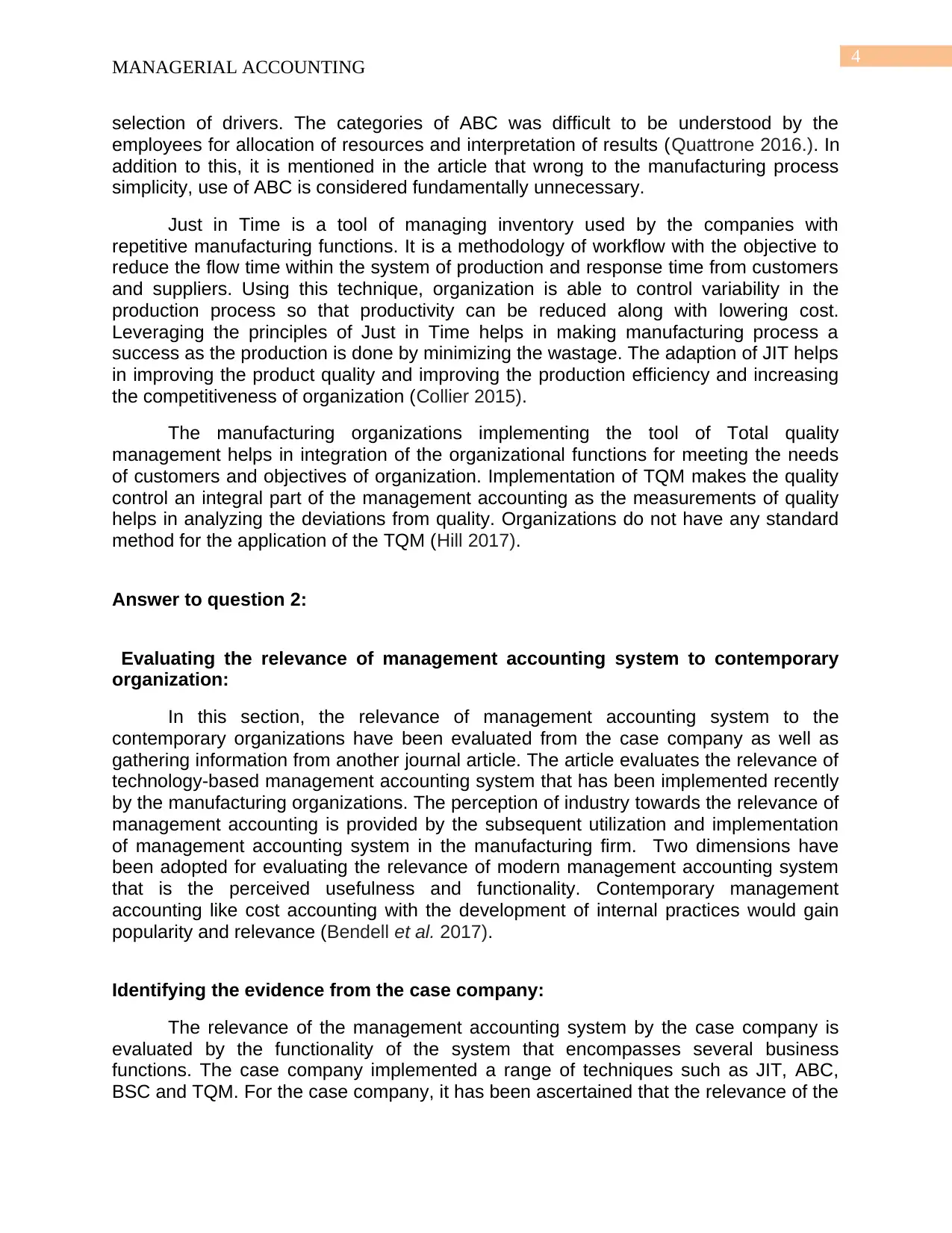
4
MANAGERIAL ACCOUNTING
selection of drivers. The categories of ABC was difficult to be understood by the
employees for allocation of resources and interpretation of results (Quattrone 2016.). In
addition to this, it is mentioned in the article that wrong to the manufacturing process
simplicity, use of ABC is considered fundamentally unnecessary.
Just in Time is a tool of managing inventory used by the companies with
repetitive manufacturing functions. It is a methodology of workflow with the objective to
reduce the flow time within the system of production and response time from customers
and suppliers. Using this technique, organization is able to control variability in the
production process so that productivity can be reduced along with lowering cost.
Leveraging the principles of Just in Time helps in making manufacturing process a
success as the production is done by minimizing the wastage. The adaption of JIT helps
in improving the product quality and improving the production efficiency and increasing
the competitiveness of organization (Collier 2015).
The manufacturing organizations implementing the tool of Total quality
management helps in integration of the organizational functions for meeting the needs
of customers and objectives of organization. Implementation of TQM makes the quality
control an integral part of the management accounting as the measurements of quality
helps in analyzing the deviations from quality. Organizations do not have any standard
method for the application of the TQM (Hill 2017).
Answer to question 2:
Evaluating the relevance of management accounting system to contemporary
organization:
In this section, the relevance of management accounting system to the
contemporary organizations have been evaluated from the case company as well as
gathering information from another journal article. The article evaluates the relevance of
technology-based management accounting system that has been implemented recently
by the manufacturing organizations. The perception of industry towards the relevance of
management accounting is provided by the subsequent utilization and implementation
of management accounting system in the manufacturing firm. Two dimensions have
been adopted for evaluating the relevance of modern management accounting system
that is the perceived usefulness and functionality. Contemporary management
accounting like cost accounting with the development of internal practices would gain
popularity and relevance (Bendell et al. 2017).
Identifying the evidence from the case company:
The relevance of the management accounting system by the case company is
evaluated by the functionality of the system that encompasses several business
functions. The case company implemented a range of techniques such as JIT, ABC,
BSC and TQM. For the case company, it has been ascertained that the relevance of the
MANAGERIAL ACCOUNTING
selection of drivers. The categories of ABC was difficult to be understood by the
employees for allocation of resources and interpretation of results (Quattrone 2016.). In
addition to this, it is mentioned in the article that wrong to the manufacturing process
simplicity, use of ABC is considered fundamentally unnecessary.
Just in Time is a tool of managing inventory used by the companies with
repetitive manufacturing functions. It is a methodology of workflow with the objective to
reduce the flow time within the system of production and response time from customers
and suppliers. Using this technique, organization is able to control variability in the
production process so that productivity can be reduced along with lowering cost.
Leveraging the principles of Just in Time helps in making manufacturing process a
success as the production is done by minimizing the wastage. The adaption of JIT helps
in improving the product quality and improving the production efficiency and increasing
the competitiveness of organization (Collier 2015).
The manufacturing organizations implementing the tool of Total quality
management helps in integration of the organizational functions for meeting the needs
of customers and objectives of organization. Implementation of TQM makes the quality
control an integral part of the management accounting as the measurements of quality
helps in analyzing the deviations from quality. Organizations do not have any standard
method for the application of the TQM (Hill 2017).
Answer to question 2:
Evaluating the relevance of management accounting system to contemporary
organization:
In this section, the relevance of management accounting system to the
contemporary organizations have been evaluated from the case company as well as
gathering information from another journal article. The article evaluates the relevance of
technology-based management accounting system that has been implemented recently
by the manufacturing organizations. The perception of industry towards the relevance of
management accounting is provided by the subsequent utilization and implementation
of management accounting system in the manufacturing firm. Two dimensions have
been adopted for evaluating the relevance of modern management accounting system
that is the perceived usefulness and functionality. Contemporary management
accounting like cost accounting with the development of internal practices would gain
popularity and relevance (Bendell et al. 2017).
Identifying the evidence from the case company:
The relevance of the management accounting system by the case company is
evaluated by the functionality of the system that encompasses several business
functions. The case company implemented a range of techniques such as JIT, ABC,
BSC and TQM. For the case company, it has been ascertained that the relevance of the
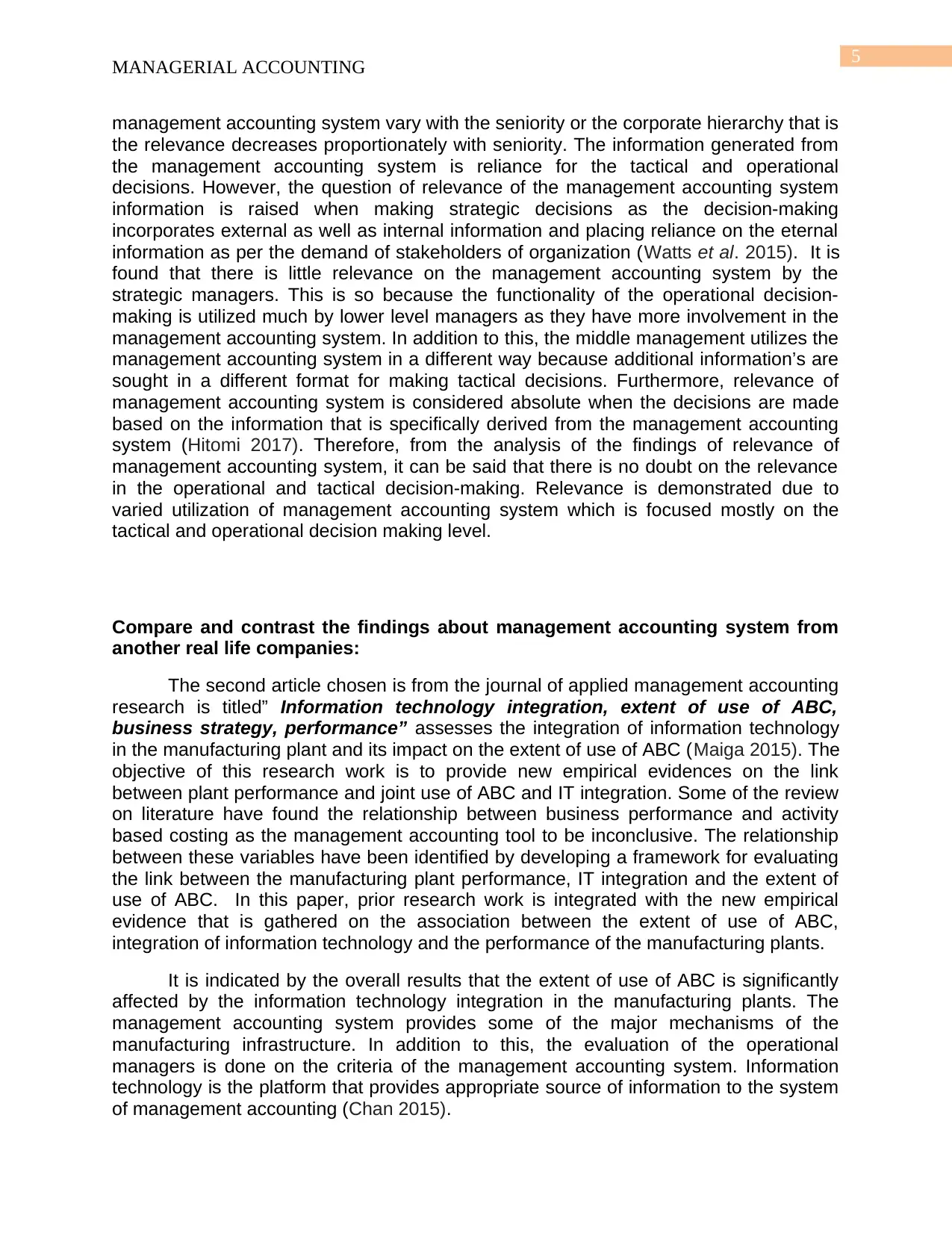
5
MANAGERIAL ACCOUNTING
management accounting system vary with the seniority or the corporate hierarchy that is
the relevance decreases proportionately with seniority. The information generated from
the management accounting system is reliance for the tactical and operational
decisions. However, the question of relevance of the management accounting system
information is raised when making strategic decisions as the decision-making
incorporates external as well as internal information and placing reliance on the eternal
information as per the demand of stakeholders of organization (Watts et al. 2015). It is
found that there is little relevance on the management accounting system by the
strategic managers. This is so because the functionality of the operational decision-
making is utilized much by lower level managers as they have more involvement in the
management accounting system. In addition to this, the middle management utilizes the
management accounting system in a different way because additional information’s are
sought in a different format for making tactical decisions. Furthermore, relevance of
management accounting system is considered absolute when the decisions are made
based on the information that is specifically derived from the management accounting
system (Hitomi 2017). Therefore, from the analysis of the findings of relevance of
management accounting system, it can be said that there is no doubt on the relevance
in the operational and tactical decision-making. Relevance is demonstrated due to
varied utilization of management accounting system which is focused mostly on the
tactical and operational decision making level.
Compare and contrast the findings about management accounting system from
another real life companies:
The second article chosen is from the journal of applied management accounting
research is titled” Information technology integration, extent of use of ABC,
business strategy, performance” assesses the integration of information technology
in the manufacturing plant and its impact on the extent of use of ABC (Maiga 2015). The
objective of this research work is to provide new empirical evidences on the link
between plant performance and joint use of ABC and IT integration. Some of the review
on literature have found the relationship between business performance and activity
based costing as the management accounting tool to be inconclusive. The relationship
between these variables have been identified by developing a framework for evaluating
the link between the manufacturing plant performance, IT integration and the extent of
use of ABC. In this paper, prior research work is integrated with the new empirical
evidence that is gathered on the association between the extent of use of ABC,
integration of information technology and the performance of the manufacturing plants.
It is indicated by the overall results that the extent of use of ABC is significantly
affected by the information technology integration in the manufacturing plants. The
management accounting system provides some of the major mechanisms of the
manufacturing infrastructure. In addition to this, the evaluation of the operational
managers is done on the criteria of the management accounting system. Information
technology is the platform that provides appropriate source of information to the system
of management accounting (Chan 2015).
MANAGERIAL ACCOUNTING
management accounting system vary with the seniority or the corporate hierarchy that is
the relevance decreases proportionately with seniority. The information generated from
the management accounting system is reliance for the tactical and operational
decisions. However, the question of relevance of the management accounting system
information is raised when making strategic decisions as the decision-making
incorporates external as well as internal information and placing reliance on the eternal
information as per the demand of stakeholders of organization (Watts et al. 2015). It is
found that there is little relevance on the management accounting system by the
strategic managers. This is so because the functionality of the operational decision-
making is utilized much by lower level managers as they have more involvement in the
management accounting system. In addition to this, the middle management utilizes the
management accounting system in a different way because additional information’s are
sought in a different format for making tactical decisions. Furthermore, relevance of
management accounting system is considered absolute when the decisions are made
based on the information that is specifically derived from the management accounting
system (Hitomi 2017). Therefore, from the analysis of the findings of relevance of
management accounting system, it can be said that there is no doubt on the relevance
in the operational and tactical decision-making. Relevance is demonstrated due to
varied utilization of management accounting system which is focused mostly on the
tactical and operational decision making level.
Compare and contrast the findings about management accounting system from
another real life companies:
The second article chosen is from the journal of applied management accounting
research is titled” Information technology integration, extent of use of ABC,
business strategy, performance” assesses the integration of information technology
in the manufacturing plant and its impact on the extent of use of ABC (Maiga 2015). The
objective of this research work is to provide new empirical evidences on the link
between plant performance and joint use of ABC and IT integration. Some of the review
on literature have found the relationship between business performance and activity
based costing as the management accounting tool to be inconclusive. The relationship
between these variables have been identified by developing a framework for evaluating
the link between the manufacturing plant performance, IT integration and the extent of
use of ABC. In this paper, prior research work is integrated with the new empirical
evidence that is gathered on the association between the extent of use of ABC,
integration of information technology and the performance of the manufacturing plants.
It is indicated by the overall results that the extent of use of ABC is significantly
affected by the information technology integration in the manufacturing plants. The
management accounting system provides some of the major mechanisms of the
manufacturing infrastructure. In addition to this, the evaluation of the operational
managers is done on the criteria of the management accounting system. Information
technology is the platform that provides appropriate source of information to the system
of management accounting (Chan 2015).
⊘ This is a preview!⊘
Do you want full access?
Subscribe today to unlock all pages.

Trusted by 1+ million students worldwide
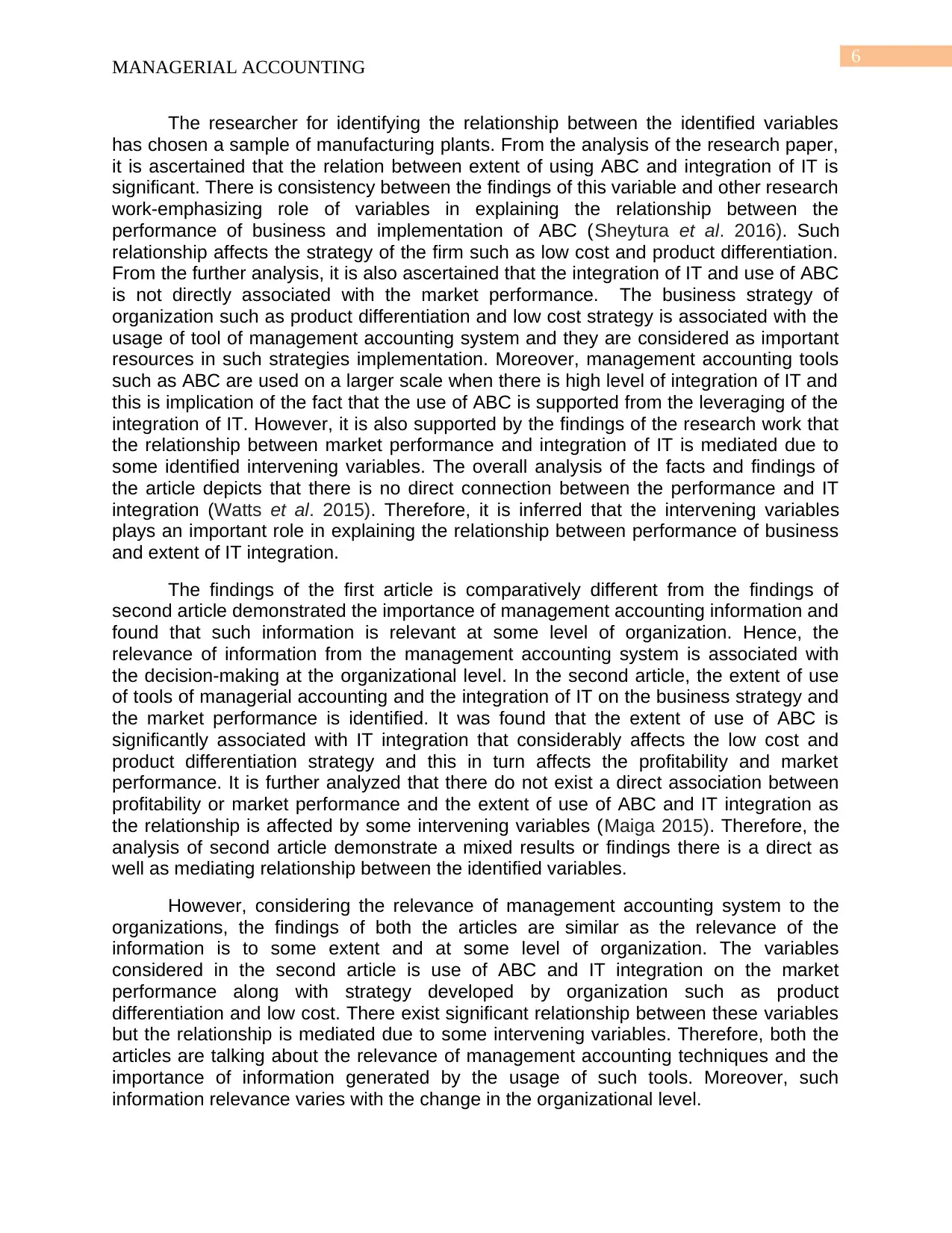
6
MANAGERIAL ACCOUNTING
The researcher for identifying the relationship between the identified variables
has chosen a sample of manufacturing plants. From the analysis of the research paper,
it is ascertained that the relation between extent of using ABC and integration of IT is
significant. There is consistency between the findings of this variable and other research
work-emphasizing role of variables in explaining the relationship between the
performance of business and implementation of ABC (Sheytura et al. 2016). Such
relationship affects the strategy of the firm such as low cost and product differentiation.
From the further analysis, it is also ascertained that the integration of IT and use of ABC
is not directly associated with the market performance. The business strategy of
organization such as product differentiation and low cost strategy is associated with the
usage of tool of management accounting system and they are considered as important
resources in such strategies implementation. Moreover, management accounting tools
such as ABC are used on a larger scale when there is high level of integration of IT and
this is implication of the fact that the use of ABC is supported from the leveraging of the
integration of IT. However, it is also supported by the findings of the research work that
the relationship between market performance and integration of IT is mediated due to
some identified intervening variables. The overall analysis of the facts and findings of
the article depicts that there is no direct connection between the performance and IT
integration (Watts et al. 2015). Therefore, it is inferred that the intervening variables
plays an important role in explaining the relationship between performance of business
and extent of IT integration.
The findings of the first article is comparatively different from the findings of
second article demonstrated the importance of management accounting information and
found that such information is relevant at some level of organization. Hence, the
relevance of information from the management accounting system is associated with
the decision-making at the organizational level. In the second article, the extent of use
of tools of managerial accounting and the integration of IT on the business strategy and
the market performance is identified. It was found that the extent of use of ABC is
significantly associated with IT integration that considerably affects the low cost and
product differentiation strategy and this in turn affects the profitability and market
performance. It is further analyzed that there do not exist a direct association between
profitability or market performance and the extent of use of ABC and IT integration as
the relationship is affected by some intervening variables (Maiga 2015). Therefore, the
analysis of second article demonstrate a mixed results or findings there is a direct as
well as mediating relationship between the identified variables.
However, considering the relevance of management accounting system to the
organizations, the findings of both the articles are similar as the relevance of the
information is to some extent and at some level of organization. The variables
considered in the second article is use of ABC and IT integration on the market
performance along with strategy developed by organization such as product
differentiation and low cost. There exist significant relationship between these variables
but the relationship is mediated due to some intervening variables. Therefore, both the
articles are talking about the relevance of management accounting techniques and the
importance of information generated by the usage of such tools. Moreover, such
information relevance varies with the change in the organizational level.
MANAGERIAL ACCOUNTING
The researcher for identifying the relationship between the identified variables
has chosen a sample of manufacturing plants. From the analysis of the research paper,
it is ascertained that the relation between extent of using ABC and integration of IT is
significant. There is consistency between the findings of this variable and other research
work-emphasizing role of variables in explaining the relationship between the
performance of business and implementation of ABC (Sheytura et al. 2016). Such
relationship affects the strategy of the firm such as low cost and product differentiation.
From the further analysis, it is also ascertained that the integration of IT and use of ABC
is not directly associated with the market performance. The business strategy of
organization such as product differentiation and low cost strategy is associated with the
usage of tool of management accounting system and they are considered as important
resources in such strategies implementation. Moreover, management accounting tools
such as ABC are used on a larger scale when there is high level of integration of IT and
this is implication of the fact that the use of ABC is supported from the leveraging of the
integration of IT. However, it is also supported by the findings of the research work that
the relationship between market performance and integration of IT is mediated due to
some identified intervening variables. The overall analysis of the facts and findings of
the article depicts that there is no direct connection between the performance and IT
integration (Watts et al. 2015). Therefore, it is inferred that the intervening variables
plays an important role in explaining the relationship between performance of business
and extent of IT integration.
The findings of the first article is comparatively different from the findings of
second article demonstrated the importance of management accounting information and
found that such information is relevant at some level of organization. Hence, the
relevance of information from the management accounting system is associated with
the decision-making at the organizational level. In the second article, the extent of use
of tools of managerial accounting and the integration of IT on the business strategy and
the market performance is identified. It was found that the extent of use of ABC is
significantly associated with IT integration that considerably affects the low cost and
product differentiation strategy and this in turn affects the profitability and market
performance. It is further analyzed that there do not exist a direct association between
profitability or market performance and the extent of use of ABC and IT integration as
the relationship is affected by some intervening variables (Maiga 2015). Therefore, the
analysis of second article demonstrate a mixed results or findings there is a direct as
well as mediating relationship between the identified variables.
However, considering the relevance of management accounting system to the
organizations, the findings of both the articles are similar as the relevance of the
information is to some extent and at some level of organization. The variables
considered in the second article is use of ABC and IT integration on the market
performance along with strategy developed by organization such as product
differentiation and low cost. There exist significant relationship between these variables
but the relationship is mediated due to some intervening variables. Therefore, both the
articles are talking about the relevance of management accounting techniques and the
importance of information generated by the usage of such tools. Moreover, such
information relevance varies with the change in the organizational level.
Paraphrase This Document
Need a fresh take? Get an instant paraphrase of this document with our AI Paraphraser
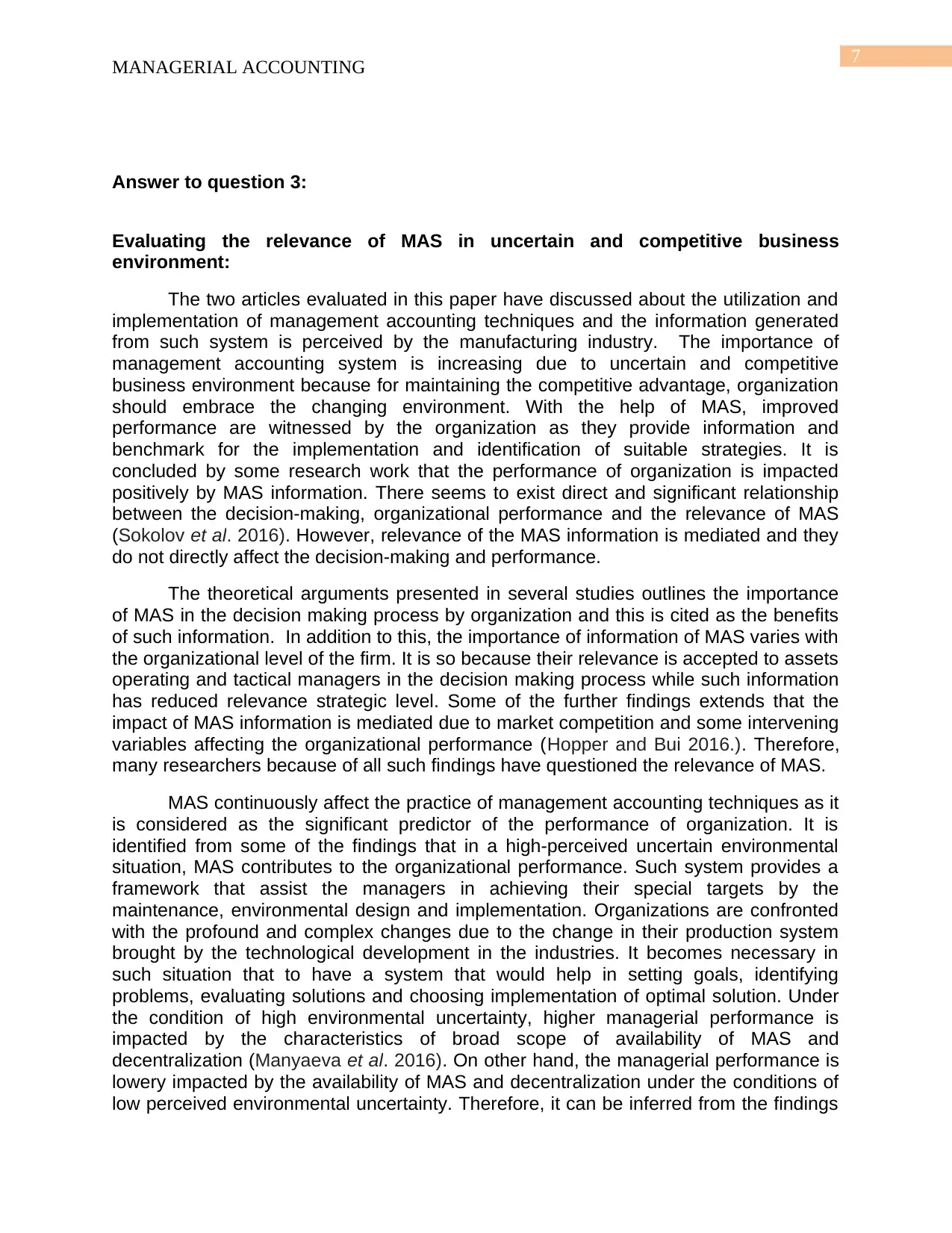
7
MANAGERIAL ACCOUNTING
Answer to question 3:
Evaluating the relevance of MAS in uncertain and competitive business
environment:
The two articles evaluated in this paper have discussed about the utilization and
implementation of management accounting techniques and the information generated
from such system is perceived by the manufacturing industry. The importance of
management accounting system is increasing due to uncertain and competitive
business environment because for maintaining the competitive advantage, organization
should embrace the changing environment. With the help of MAS, improved
performance are witnessed by the organization as they provide information and
benchmark for the implementation and identification of suitable strategies. It is
concluded by some research work that the performance of organization is impacted
positively by MAS information. There seems to exist direct and significant relationship
between the decision-making, organizational performance and the relevance of MAS
(Sokolov et al. 2016). However, relevance of the MAS information is mediated and they
do not directly affect the decision-making and performance.
The theoretical arguments presented in several studies outlines the importance
of MAS in the decision making process by organization and this is cited as the benefits
of such information. In addition to this, the importance of information of MAS varies with
the organizational level of the firm. It is so because their relevance is accepted to assets
operating and tactical managers in the decision making process while such information
has reduced relevance strategic level. Some of the further findings extends that the
impact of MAS information is mediated due to market competition and some intervening
variables affecting the organizational performance (Hopper and Bui 2016.). Therefore,
many researchers because of all such findings have questioned the relevance of MAS.
MAS continuously affect the practice of management accounting techniques as it
is considered as the significant predictor of the performance of organization. It is
identified from some of the findings that in a high-perceived uncertain environmental
situation, MAS contributes to the organizational performance. Such system provides a
framework that assist the managers in achieving their special targets by the
maintenance, environmental design and implementation. Organizations are confronted
with the profound and complex changes due to the change in their production system
brought by the technological development in the industries. It becomes necessary in
such situation that to have a system that would help in setting goals, identifying
problems, evaluating solutions and choosing implementation of optimal solution. Under
the condition of high environmental uncertainty, higher managerial performance is
impacted by the characteristics of broad scope of availability of MAS and
decentralization (Manyaeva et al. 2016). On other hand, the managerial performance is
lowery impacted by the availability of MAS and decentralization under the conditions of
low perceived environmental uncertainty. Therefore, it can be inferred from the findings
MANAGERIAL ACCOUNTING
Answer to question 3:
Evaluating the relevance of MAS in uncertain and competitive business
environment:
The two articles evaluated in this paper have discussed about the utilization and
implementation of management accounting techniques and the information generated
from such system is perceived by the manufacturing industry. The importance of
management accounting system is increasing due to uncertain and competitive
business environment because for maintaining the competitive advantage, organization
should embrace the changing environment. With the help of MAS, improved
performance are witnessed by the organization as they provide information and
benchmark for the implementation and identification of suitable strategies. It is
concluded by some research work that the performance of organization is impacted
positively by MAS information. There seems to exist direct and significant relationship
between the decision-making, organizational performance and the relevance of MAS
(Sokolov et al. 2016). However, relevance of the MAS information is mediated and they
do not directly affect the decision-making and performance.
The theoretical arguments presented in several studies outlines the importance
of MAS in the decision making process by organization and this is cited as the benefits
of such information. In addition to this, the importance of information of MAS varies with
the organizational level of the firm. It is so because their relevance is accepted to assets
operating and tactical managers in the decision making process while such information
has reduced relevance strategic level. Some of the further findings extends that the
impact of MAS information is mediated due to market competition and some intervening
variables affecting the organizational performance (Hopper and Bui 2016.). Therefore,
many researchers because of all such findings have questioned the relevance of MAS.
MAS continuously affect the practice of management accounting techniques as it
is considered as the significant predictor of the performance of organization. It is
identified from some of the findings that in a high-perceived uncertain environmental
situation, MAS contributes to the organizational performance. Such system provides a
framework that assist the managers in achieving their special targets by the
maintenance, environmental design and implementation. Organizations are confronted
with the profound and complex changes due to the change in their production system
brought by the technological development in the industries. It becomes necessary in
such situation that to have a system that would help in setting goals, identifying
problems, evaluating solutions and choosing implementation of optimal solution. Under
the condition of high environmental uncertainty, higher managerial performance is
impacted by the characteristics of broad scope of availability of MAS and
decentralization (Manyaeva et al. 2016). On other hand, the managerial performance is
lowery impacted by the availability of MAS and decentralization under the conditions of
low perceived environmental uncertainty. Therefore, it can be inferred from the findings
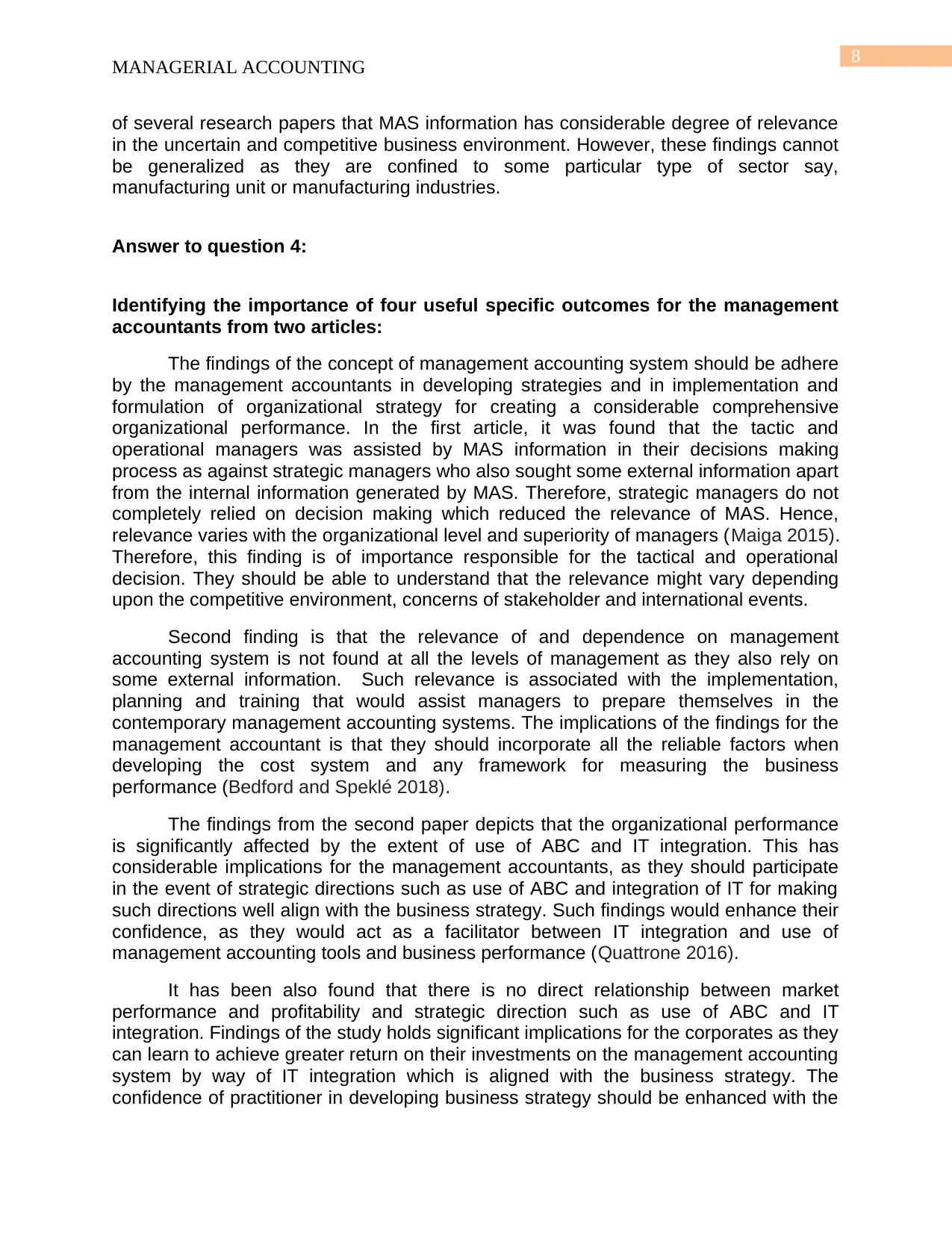
8
MANAGERIAL ACCOUNTING
of several research papers that MAS information has considerable degree of relevance
in the uncertain and competitive business environment. However, these findings cannot
be generalized as they are confined to some particular type of sector say,
manufacturing unit or manufacturing industries.
Answer to question 4:
Identifying the importance of four useful specific outcomes for the management
accountants from two articles:
The findings of the concept of management accounting system should be adhere
by the management accountants in developing strategies and in implementation and
formulation of organizational strategy for creating a considerable comprehensive
organizational performance. In the first article, it was found that the tactic and
operational managers was assisted by MAS information in their decisions making
process as against strategic managers who also sought some external information apart
from the internal information generated by MAS. Therefore, strategic managers do not
completely relied on decision making which reduced the relevance of MAS. Hence,
relevance varies with the organizational level and superiority of managers (Maiga 2015).
Therefore, this finding is of importance responsible for the tactical and operational
decision. They should be able to understand that the relevance might vary depending
upon the competitive environment, concerns of stakeholder and international events.
Second finding is that the relevance of and dependence on management
accounting system is not found at all the levels of management as they also rely on
some external information. Such relevance is associated with the implementation,
planning and training that would assist managers to prepare themselves in the
contemporary management accounting systems. The implications of the findings for the
management accountant is that they should incorporate all the reliable factors when
developing the cost system and any framework for measuring the business
performance (Bedford and Speklé 2018).
The findings from the second paper depicts that the organizational performance
is significantly affected by the extent of use of ABC and IT integration. This has
considerable implications for the management accountants, as they should participate
in the event of strategic directions such as use of ABC and integration of IT for making
such directions well align with the business strategy. Such findings would enhance their
confidence, as they would act as a facilitator between IT integration and use of
management accounting tools and business performance (Quattrone 2016).
It has been also found that there is no direct relationship between market
performance and profitability and strategic direction such as use of ABC and IT
integration. Findings of the study holds significant implications for the corporates as they
can learn to achieve greater return on their investments on the management accounting
system by way of IT integration which is aligned with the business strategy. The
confidence of practitioner in developing business strategy should be enhanced with the
MANAGERIAL ACCOUNTING
of several research papers that MAS information has considerable degree of relevance
in the uncertain and competitive business environment. However, these findings cannot
be generalized as they are confined to some particular type of sector say,
manufacturing unit or manufacturing industries.
Answer to question 4:
Identifying the importance of four useful specific outcomes for the management
accountants from two articles:
The findings of the concept of management accounting system should be adhere
by the management accountants in developing strategies and in implementation and
formulation of organizational strategy for creating a considerable comprehensive
organizational performance. In the first article, it was found that the tactic and
operational managers was assisted by MAS information in their decisions making
process as against strategic managers who also sought some external information apart
from the internal information generated by MAS. Therefore, strategic managers do not
completely relied on decision making which reduced the relevance of MAS. Hence,
relevance varies with the organizational level and superiority of managers (Maiga 2015).
Therefore, this finding is of importance responsible for the tactical and operational
decision. They should be able to understand that the relevance might vary depending
upon the competitive environment, concerns of stakeholder and international events.
Second finding is that the relevance of and dependence on management
accounting system is not found at all the levels of management as they also rely on
some external information. Such relevance is associated with the implementation,
planning and training that would assist managers to prepare themselves in the
contemporary management accounting systems. The implications of the findings for the
management accountant is that they should incorporate all the reliable factors when
developing the cost system and any framework for measuring the business
performance (Bedford and Speklé 2018).
The findings from the second paper depicts that the organizational performance
is significantly affected by the extent of use of ABC and IT integration. This has
considerable implications for the management accountants, as they should participate
in the event of strategic directions such as use of ABC and integration of IT for making
such directions well align with the business strategy. Such findings would enhance their
confidence, as they would act as a facilitator between IT integration and use of
management accounting tools and business performance (Quattrone 2016).
It has been also found that there is no direct relationship between market
performance and profitability and strategic direction such as use of ABC and IT
integration. Findings of the study holds significant implications for the corporates as they
can learn to achieve greater return on their investments on the management accounting
system by way of IT integration which is aligned with the business strategy. The
confidence of practitioner in developing business strategy should be enhanced with the
⊘ This is a preview!⊘
Do you want full access?
Subscribe today to unlock all pages.

Trusted by 1+ million students worldwide
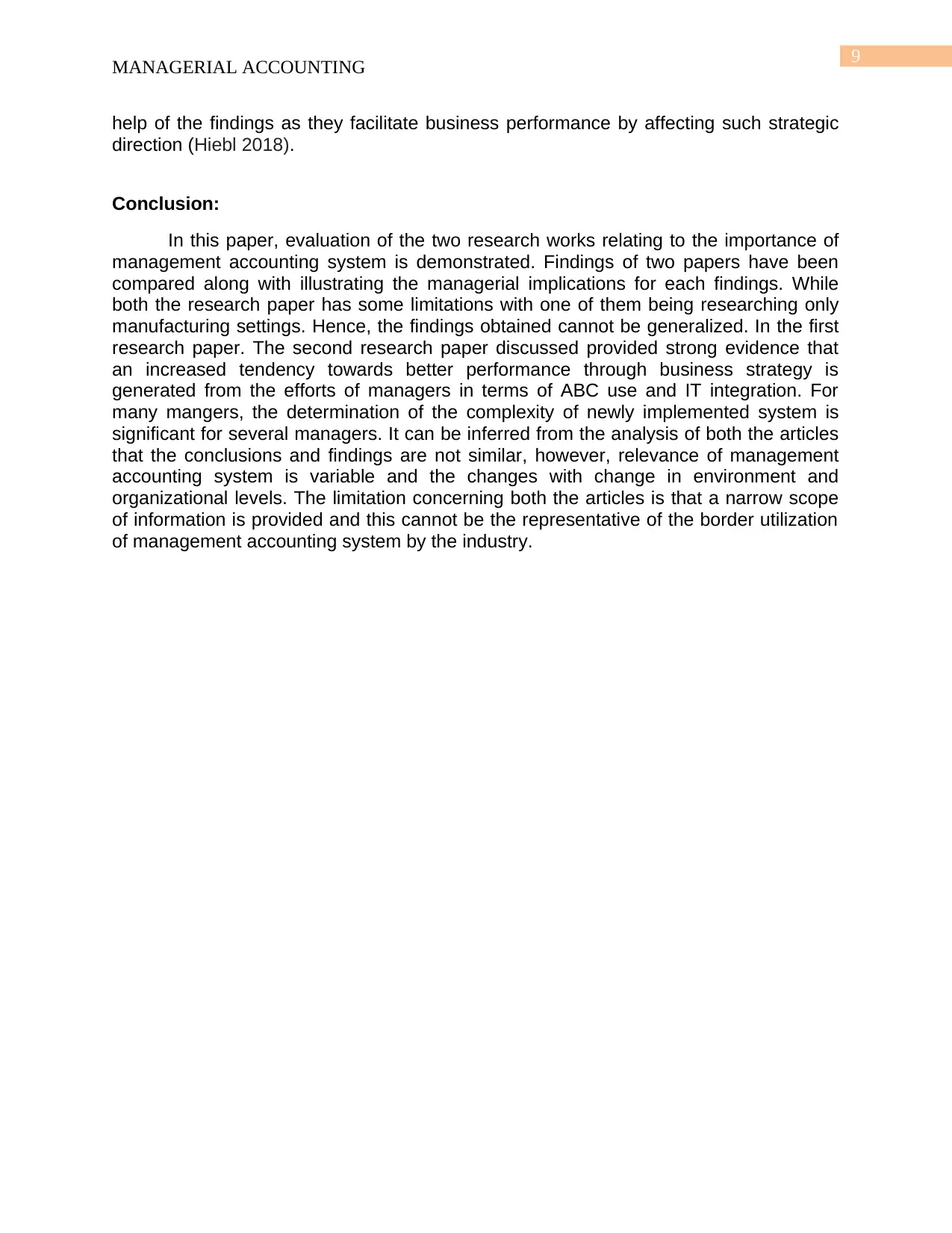
9
MANAGERIAL ACCOUNTING
help of the findings as they facilitate business performance by affecting such strategic
direction (Hiebl 2018).
Conclusion:
In this paper, evaluation of the two research works relating to the importance of
management accounting system is demonstrated. Findings of two papers have been
compared along with illustrating the managerial implications for each findings. While
both the research paper has some limitations with one of them being researching only
manufacturing settings. Hence, the findings obtained cannot be generalized. In the first
research paper. The second research paper discussed provided strong evidence that
an increased tendency towards better performance through business strategy is
generated from the efforts of managers in terms of ABC use and IT integration. For
many mangers, the determination of the complexity of newly implemented system is
significant for several managers. It can be inferred from the analysis of both the articles
that the conclusions and findings are not similar, however, relevance of management
accounting system is variable and the changes with change in environment and
organizational levels. The limitation concerning both the articles is that a narrow scope
of information is provided and this cannot be the representative of the border utilization
of management accounting system by the industry.
MANAGERIAL ACCOUNTING
help of the findings as they facilitate business performance by affecting such strategic
direction (Hiebl 2018).
Conclusion:
In this paper, evaluation of the two research works relating to the importance of
management accounting system is demonstrated. Findings of two papers have been
compared along with illustrating the managerial implications for each findings. While
both the research paper has some limitations with one of them being researching only
manufacturing settings. Hence, the findings obtained cannot be generalized. In the first
research paper. The second research paper discussed provided strong evidence that
an increased tendency towards better performance through business strategy is
generated from the efforts of managers in terms of ABC use and IT integration. For
many mangers, the determination of the complexity of newly implemented system is
significant for several managers. It can be inferred from the analysis of both the articles
that the conclusions and findings are not similar, however, relevance of management
accounting system is variable and the changes with change in environment and
organizational levels. The limitation concerning both the articles is that a narrow scope
of information is provided and this cannot be the representative of the border utilization
of management accounting system by the industry.
Paraphrase This Document
Need a fresh take? Get an instant paraphrase of this document with our AI Paraphraser
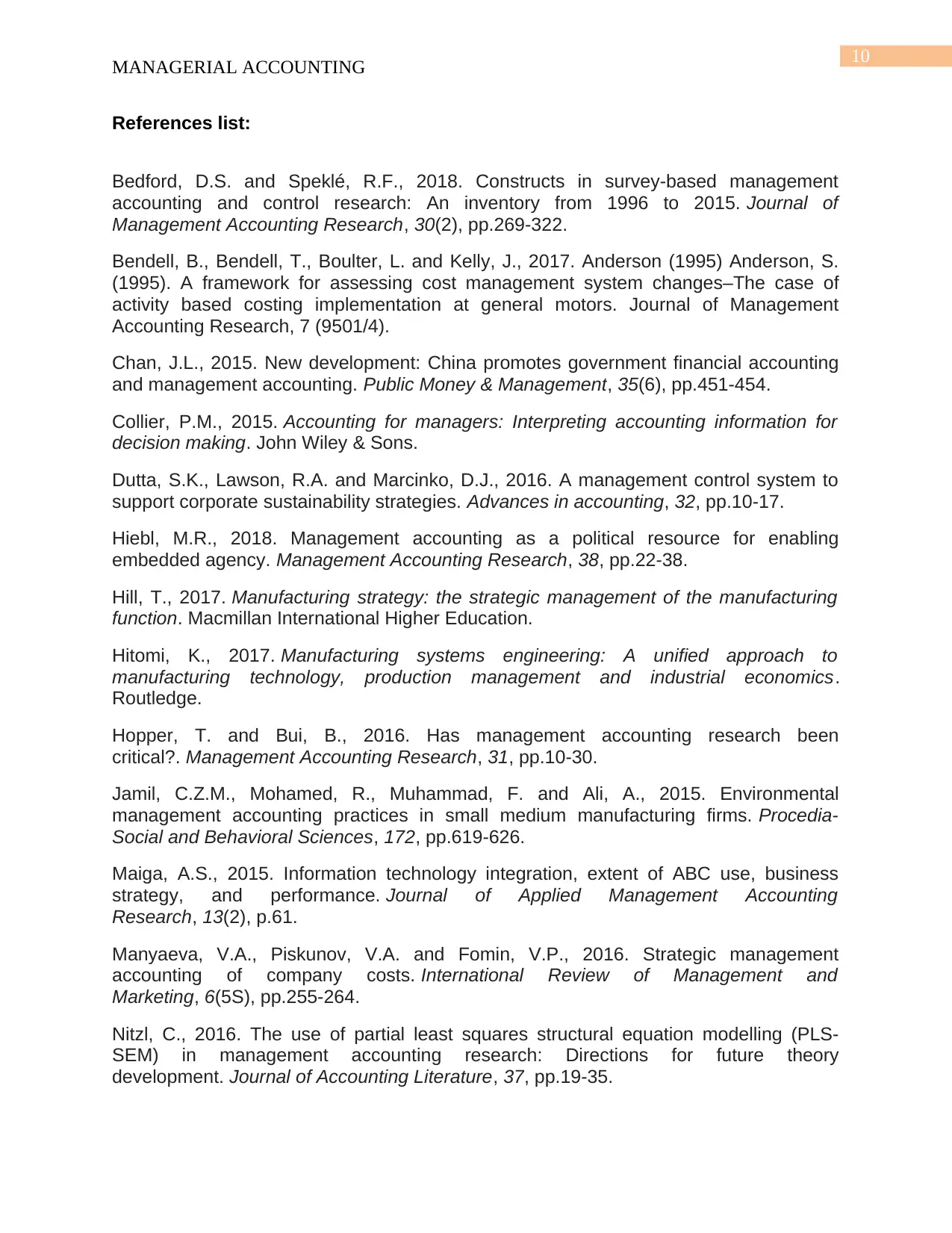
10
MANAGERIAL ACCOUNTING
References list:
Bedford, D.S. and Speklé, R.F., 2018. Constructs in survey-based management
accounting and control research: An inventory from 1996 to 2015. Journal of
Management Accounting Research, 30(2), pp.269-322.
Bendell, B., Bendell, T., Boulter, L. and Kelly, J., 2017. Anderson (1995) Anderson, S.
(1995). A framework for assessing cost management system changes–The case of
activity based costing implementation at general motors. Journal of Management
Accounting Research, 7 (9501/4).
Chan, J.L., 2015. New development: China promotes government financial accounting
and management accounting. Public Money & Management, 35(6), pp.451-454.
Collier, P.M., 2015. Accounting for managers: Interpreting accounting information for
decision making. John Wiley & Sons.
Dutta, S.K., Lawson, R.A. and Marcinko, D.J., 2016. A management control system to
support corporate sustainability strategies. Advances in accounting, 32, pp.10-17.
Hiebl, M.R., 2018. Management accounting as a political resource for enabling
embedded agency. Management Accounting Research, 38, pp.22-38.
Hill, T., 2017. Manufacturing strategy: the strategic management of the manufacturing
function. Macmillan International Higher Education.
Hitomi, K., 2017. Manufacturing systems engineering: A unified approach to
manufacturing technology, production management and industrial economics.
Routledge.
Hopper, T. and Bui, B., 2016. Has management accounting research been
critical?. Management Accounting Research, 31, pp.10-30.
Jamil, C.Z.M., Mohamed, R., Muhammad, F. and Ali, A., 2015. Environmental
management accounting practices in small medium manufacturing firms. Procedia-
Social and Behavioral Sciences, 172, pp.619-626.
Maiga, A.S., 2015. Information technology integration, extent of ABC use, business
strategy, and performance. Journal of Applied Management Accounting
Research, 13(2), p.61.
Manyaeva, V.A., Piskunov, V.A. and Fomin, V.P., 2016. Strategic management
accounting of company costs. International Review of Management and
Marketing, 6(5S), pp.255-264.
Nitzl, C., 2016. The use of partial least squares structural equation modelling (PLS-
SEM) in management accounting research: Directions for future theory
development. Journal of Accounting Literature, 37, pp.19-35.
MANAGERIAL ACCOUNTING
References list:
Bedford, D.S. and Speklé, R.F., 2018. Constructs in survey-based management
accounting and control research: An inventory from 1996 to 2015. Journal of
Management Accounting Research, 30(2), pp.269-322.
Bendell, B., Bendell, T., Boulter, L. and Kelly, J., 2017. Anderson (1995) Anderson, S.
(1995). A framework for assessing cost management system changes–The case of
activity based costing implementation at general motors. Journal of Management
Accounting Research, 7 (9501/4).
Chan, J.L., 2015. New development: China promotes government financial accounting
and management accounting. Public Money & Management, 35(6), pp.451-454.
Collier, P.M., 2015. Accounting for managers: Interpreting accounting information for
decision making. John Wiley & Sons.
Dutta, S.K., Lawson, R.A. and Marcinko, D.J., 2016. A management control system to
support corporate sustainability strategies. Advances in accounting, 32, pp.10-17.
Hiebl, M.R., 2018. Management accounting as a political resource for enabling
embedded agency. Management Accounting Research, 38, pp.22-38.
Hill, T., 2017. Manufacturing strategy: the strategic management of the manufacturing
function. Macmillan International Higher Education.
Hitomi, K., 2017. Manufacturing systems engineering: A unified approach to
manufacturing technology, production management and industrial economics.
Routledge.
Hopper, T. and Bui, B., 2016. Has management accounting research been
critical?. Management Accounting Research, 31, pp.10-30.
Jamil, C.Z.M., Mohamed, R., Muhammad, F. and Ali, A., 2015. Environmental
management accounting practices in small medium manufacturing firms. Procedia-
Social and Behavioral Sciences, 172, pp.619-626.
Maiga, A.S., 2015. Information technology integration, extent of ABC use, business
strategy, and performance. Journal of Applied Management Accounting
Research, 13(2), p.61.
Manyaeva, V.A., Piskunov, V.A. and Fomin, V.P., 2016. Strategic management
accounting of company costs. International Review of Management and
Marketing, 6(5S), pp.255-264.
Nitzl, C., 2016. The use of partial least squares structural equation modelling (PLS-
SEM) in management accounting research: Directions for future theory
development. Journal of Accounting Literature, 37, pp.19-35.
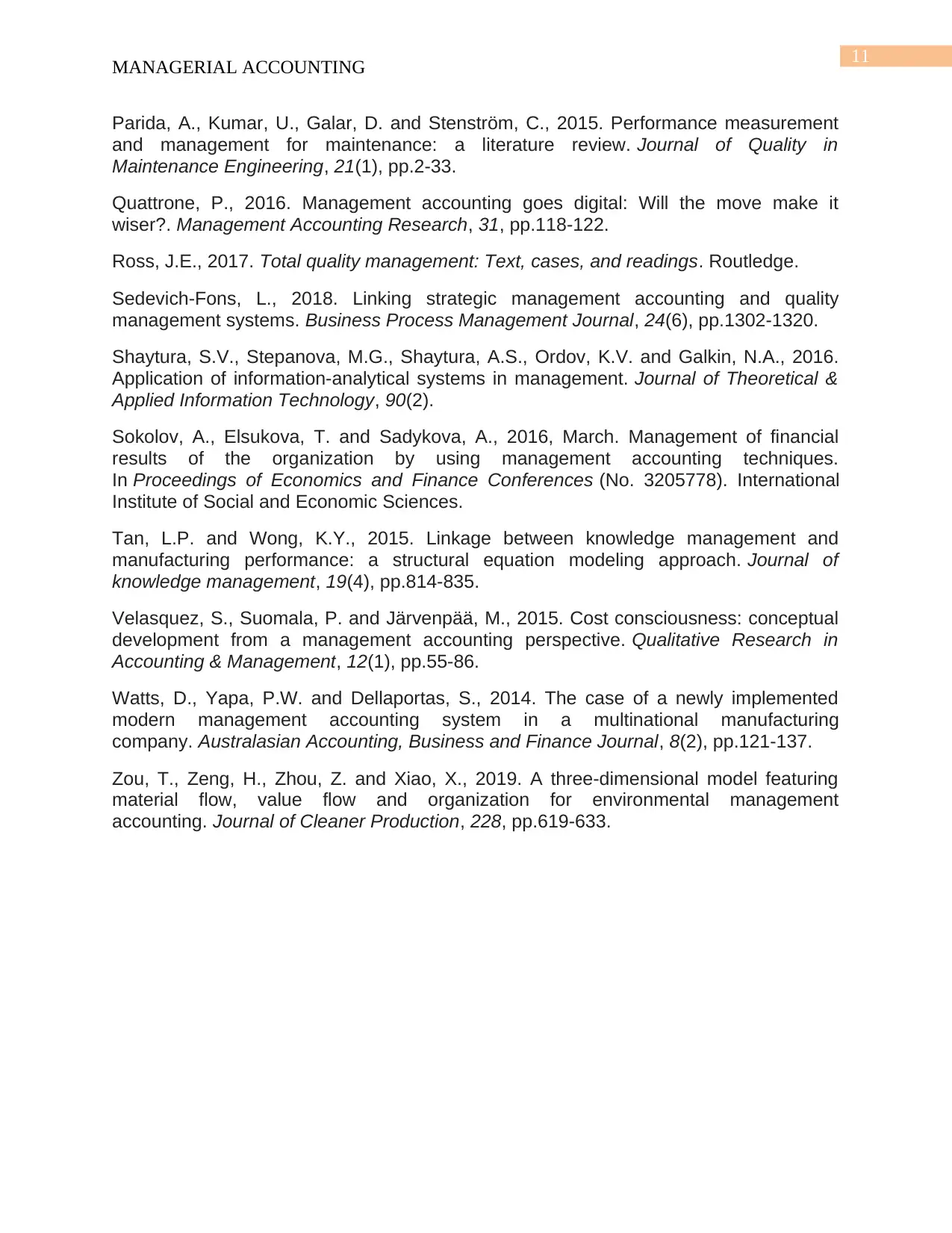
11
MANAGERIAL ACCOUNTING
Parida, A., Kumar, U., Galar, D. and Stenström, C., 2015. Performance measurement
and management for maintenance: a literature review. Journal of Quality in
Maintenance Engineering, 21(1), pp.2-33.
Quattrone, P., 2016. Management accounting goes digital: Will the move make it
wiser?. Management Accounting Research, 31, pp.118-122.
Ross, J.E., 2017. Total quality management: Text, cases, and readings. Routledge.
Sedevich-Fons, L., 2018. Linking strategic management accounting and quality
management systems. Business Process Management Journal, 24(6), pp.1302-1320.
Shaytura, S.V., Stepanova, M.G., Shaytura, A.S., Ordov, K.V. and Galkin, N.A., 2016.
Application of information-analytical systems in management. Journal of Theoretical &
Applied Information Technology, 90(2).
Sokolov, A., Elsukova, T. and Sadykova, A., 2016, March. Management of financial
results of the organization by using management accounting techniques.
In Proceedings of Economics and Finance Conferences (No. 3205778). International
Institute of Social and Economic Sciences.
Tan, L.P. and Wong, K.Y., 2015. Linkage between knowledge management and
manufacturing performance: a structural equation modeling approach. Journal of
knowledge management, 19(4), pp.814-835.
Velasquez, S., Suomala, P. and Järvenpää, M., 2015. Cost consciousness: conceptual
development from a management accounting perspective. Qualitative Research in
Accounting & Management, 12(1), pp.55-86.
Watts, D., Yapa, P.W. and Dellaportas, S., 2014. The case of a newly implemented
modern management accounting system in a multinational manufacturing
company. Australasian Accounting, Business and Finance Journal, 8(2), pp.121-137.
Zou, T., Zeng, H., Zhou, Z. and Xiao, X., 2019. A three-dimensional model featuring
material flow, value flow and organization for environmental management
accounting. Journal of Cleaner Production, 228, pp.619-633.
MANAGERIAL ACCOUNTING
Parida, A., Kumar, U., Galar, D. and Stenström, C., 2015. Performance measurement
and management for maintenance: a literature review. Journal of Quality in
Maintenance Engineering, 21(1), pp.2-33.
Quattrone, P., 2016. Management accounting goes digital: Will the move make it
wiser?. Management Accounting Research, 31, pp.118-122.
Ross, J.E., 2017. Total quality management: Text, cases, and readings. Routledge.
Sedevich-Fons, L., 2018. Linking strategic management accounting and quality
management systems. Business Process Management Journal, 24(6), pp.1302-1320.
Shaytura, S.V., Stepanova, M.G., Shaytura, A.S., Ordov, K.V. and Galkin, N.A., 2016.
Application of information-analytical systems in management. Journal of Theoretical &
Applied Information Technology, 90(2).
Sokolov, A., Elsukova, T. and Sadykova, A., 2016, March. Management of financial
results of the organization by using management accounting techniques.
In Proceedings of Economics and Finance Conferences (No. 3205778). International
Institute of Social and Economic Sciences.
Tan, L.P. and Wong, K.Y., 2015. Linkage between knowledge management and
manufacturing performance: a structural equation modeling approach. Journal of
knowledge management, 19(4), pp.814-835.
Velasquez, S., Suomala, P. and Järvenpää, M., 2015. Cost consciousness: conceptual
development from a management accounting perspective. Qualitative Research in
Accounting & Management, 12(1), pp.55-86.
Watts, D., Yapa, P.W. and Dellaportas, S., 2014. The case of a newly implemented
modern management accounting system in a multinational manufacturing
company. Australasian Accounting, Business and Finance Journal, 8(2), pp.121-137.
Zou, T., Zeng, H., Zhou, Z. and Xiao, X., 2019. A three-dimensional model featuring
material flow, value flow and organization for environmental management
accounting. Journal of Cleaner Production, 228, pp.619-633.
⊘ This is a preview!⊘
Do you want full access?
Subscribe today to unlock all pages.

Trusted by 1+ million students worldwide
1 out of 12
Related Documents
Your All-in-One AI-Powered Toolkit for Academic Success.
+13062052269
info@desklib.com
Available 24*7 on WhatsApp / Email
![[object Object]](/_next/static/media/star-bottom.7253800d.svg)
Unlock your academic potential
Copyright © 2020–2026 A2Z Services. All Rights Reserved. Developed and managed by ZUCOL.





